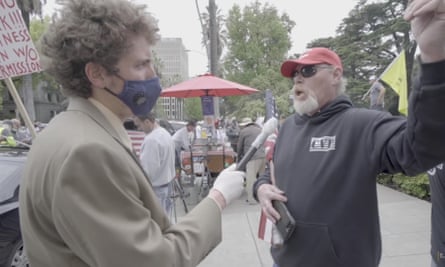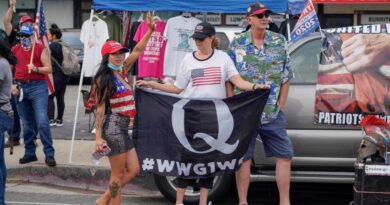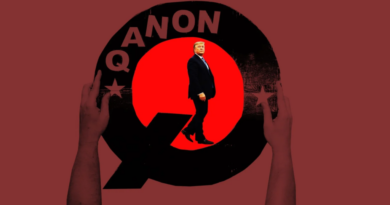QAnon conspiracists to drugged-up juggalos: the YouTube hit delving into Weird America
It is March 2020, and in San Antonio, Texas, hundreds of arms dealers, prison builders, and members of state law enforcement are meeting at the annual border security convention to sell their services, guns and military-grade equipment to anyone sharing their interest in protecting the US.
Interviewed by a lanky, deadpan reporter with wild hair and a suit that looks like something he’s stolen from his dad’s wardrobe, a shoe salesman touts the latest Reebok trainers as essential to combatting all and any threats to national security. A shotgun dealer menacingly warns the journalist not to peer into the barrel of a gun: “It’s not guaranteeing you could die, but it’s a pretty solid chance it will do substantial damage.” Elsewhere, a coronavirus-denying arms dealer with a buzzcut rants about how the pandemic will disappear after the election, and why Saudi Arabia is his least favourite country despite the good food. “My favourite entree? I ain’t a woman, so I ain’t have to worry about that.” Mexican food is served.
This is not a pandemic-era fever dream, but rather an episode of All Gas No Brakes, a hit YouTube docuseries where “vagrants, vagabonds, deadbeats, runaways and outlaws” are given a microphone and free rein. Having gone viral with videos quizzing Area 51 raiders, partygoers on the Las Vegas Strip and LSD-fuelled ravers at Burning Man, the show’s creator, Andrew Callaghan, says he is on a mission to give a platform to “true Americana”. Travelling across the US in an old RV, the 23-year-old journalism graduate has interviewed senior advisers to Donald Trump, stoners who claim “Isis is really Israel” and top-hat-wearing Flat Earthers who believe Hitler is living beneath Antarctica in the city of New Berlin.
The claims that Callaghan’s subjects come out with are often shocking, frequently nonsensical and largely offensive. To him, they speak to a growing sense of suspicion towards the media and “the way Facebook and bullshit articles have completely dominated the intellectual discourse in certain subsections of America”.
His videos expose how antisemitic conspiracy theories “are at the root of all of that. Flat Earth, QAnon, it all comes back to an idea of a global conglomerate elite cooperating to keep gentiles in submission and pump money into a global Zionist banking system. Unfortunately it’s existed for so long and it’s manifested itself in many different ways. It’s something Trump has installed with distrust in the media, and liberal media has installed with distrust in everything else.”

It’s a culture that the pandemic has only entrenched further. “All the time people have had alone in their house on the computer has created an insane spike of conspiracy theorists,” he says. “It’s almost becoming mainstream. You have people who eight years ago would have been conservative, moderate Mitt Romney supporters, believing in reptilian shapeshifter theory. It’s pretty sinister.”
Born and raised in Seattle, Callaghan spent his adolescence rapping under the name Trek God. He says during high school he was a “bad kid who got in a lot of trouble” and that he “hated every class I ever had from the first day of kindergarten to my last day of college”. The only exception was in Callaghan’s junior year, when he met his journalism teacher, the first person to believe in his storytelling.
Aged 17, Callaghan was encouraged by his teacher to leave school and cover the subjects he wanted. “I was interviewing people about buying drugs on the Silk Road [website], living in tents with the Occupy Seattle movements and interviewing the homeless people occupying that zone. I would go downtown and hang out with juggalos at West Lake Center and interview them about meth.” He took a year out before studying journalism at Loyola University, New Orleans, to hitchhike across the US, which was when All Gas No Brakes was conceived.
Callaghan’s fans draw comparisons between his work and that of others who have infiltrated the fringes of the US, such as Louis Theroux, Sacha Baron Cohen and Eric Andre. Like them, Callaghan has a natural ability to get people to talk candidly. “I’ve never written a question in my life,” he says. “I walk in not knowing anything and follow energy. People who have something to say will see a microphone and take advantage of the opportunity.”
He isn’t too concerned about the way his subjects, whom he gently plays with and subtly eggs on, embarrass themselves on camera. “I want to let people do the analysis,” he says. “I want to show them some funny and real shit, and they can think what they want about it.”
While the parallels to the awkward truths of Theroux and Baron Cohen’s satirical stunts are clear, it is Callaghan’s consideration for an online audience – with bitesize episodes and a meme-like energy – that sets him apart, and has caught the attention of the comedy duo Tim Heidecker and Eric Wareheim, who are now working with Callaghan on a TV series.
“I wanted to make something funny, palatable and built for a younger audience, and free from the constraints of an editor. It’s taking journalism back into our own hands,” says Callaghan, who says that he struggles to sit through a long documentary or read a book.
While All Gas No Brakes found fame through what he describes as his “quirky kind of troll” content, it was 2020 – a year defined by coronavirus, lockdown, political instability and reignited discussions about racial injustice and the role of the police – when the series really took off.
“I wanted to use my platform to get in the mix and cover something serious,” he says, referring to two of his favourite videos in the series, where he reported on Black Lives Matter protests in Minneapolis and Portland.
“For some reason, mainstream America is more offended by the destruction of corporate property than the destruction of black lives,” he says. “People have been peacefully protesting for what, 10 years? Trayvon Martin was a peaceful protest, and then one Target gets lit on fire and all of white America is like: ‘Not Target!’”
Callaghan says there was, however, a key difference between the protests he attended, with Portland being co-opted by the “performative allyship” of white anarchists. “I really do care about issues of racial justice and I don’t feel like any side of the media is actually allowing protesters to speak their minds,” he explains. “If I have any bias it’s that I would never try to make fun of anyone advocating for black liberation. I just care about it, there’s nothing funny about it.”
He says that he wanted to show how Minneapolis was “an immediate gut reaction to the murder of George Floyd, which manifested in looting and burning as that was the extent people felt they needed to go to to be taken seriously. But Portland was different because it is 92% white and 6% black … I showed some of the chaos but ultimately brought the focus back to the young, black, female organisers who were at the forefront, because they had the most to lose, as this was about their lives. I want to focus my attention where it matters.”
With a rapidly growing fanbase and a podcast, TV series and film all in production, Callaghan won’t be putting the brakes on All Gas No Brakes any time soon. “I’m working on a longer format, with a more fleshed-out narrative and emotional range. And then of course international content after the pandemic: soccer hooligans in Liverpool, backpackers in Thailand, tough guys in Russia, who knows. I’ll keep letting people speak their mind, and getting in the mix.”
All Gas No Brakes is available on YouTube
*** This article has been archived for your research. The original version from The Guardian can be found
***


